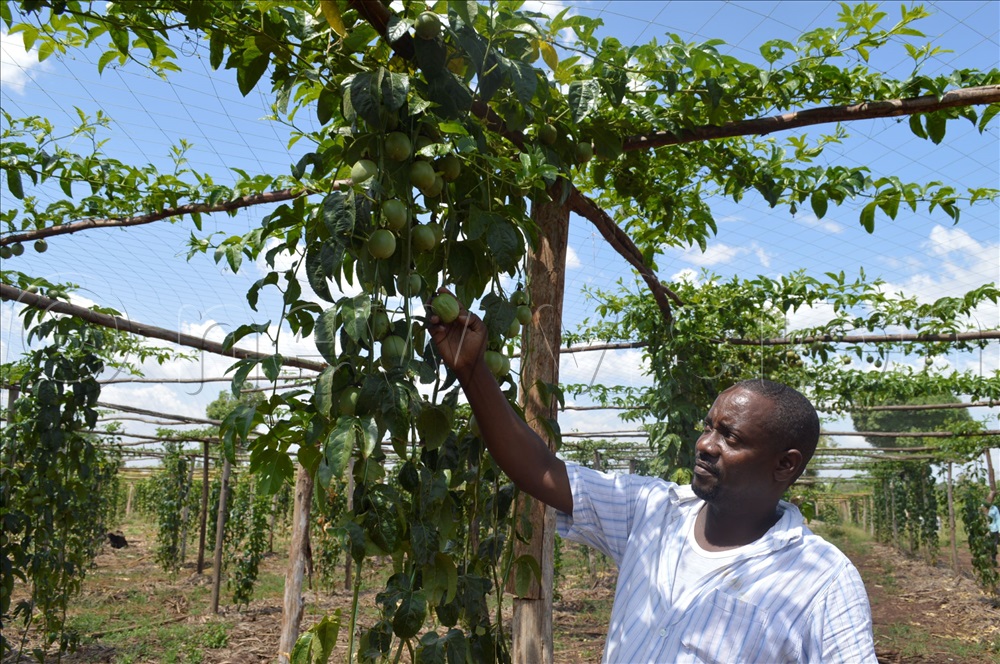By Umar Nsubuga
Passion fruit farming is a lucrative business for many Ugandan farmers, but it comes with several challenges, including attacks from harmful insects.
Twaha Kakooza, a passion fruit farmer in Kayunga district, has faced numerous battles with pests that threaten his crops.
According to Kakooza, insects not only destroy the leaves and vines but also affect the quality and yield of the fruits.
Gideon Zakke, an agronomist, explains that passion fruit plants attract various insects, some of which cause severe damage.
“Farmers must be vigilant and apply the right control measures to minimize the impact of these pests,” Zakke advises.
He points out several harmful insects that pose a threat to passion fruit production and how they affect the plants.
Common harmful insects
Aphids are tiny, soft-bodied insects that suck sap from the passion fruit leaves and stems.
Zakke says they weaken the plant by depriving it of essential nutrients, causing stunted growth and curled leaves.
Aphids produce a sticky substance called honeydew, which attracts sooty mold. This mold covers the leaves, reducing their ability to photosynthesise, which in turn affects fruit production.

Fruit flies are one of the biggest threats to passion fruit farming. These small, yellowish-brown insects lay eggs in the fruits.
When the larvae hatch, they feed on the pulp, causing premature fruit drop and rotting.
“I have lost many fruits due to fruit fly infestations,” Kakooza laments.
The damage not only reduces the harvest but also makes the fruits unmarketable.
Whiteflies are another major pest that attacks passion fruit vines. They suck sap from the leaves, causing them to turn yellow and eventually fall off.
Whiteflies also transmit viral diseases that can spread rapidly, leading to significant losses. Zakke warns that controlling whiteflies requires a combination of biological and chemical methods to ensure they do not develop resistance to pesticides.
Thrips are small insects that feed on the flowers and young leaves of the passion fruit plant. Their feeding results in deformed fruits and reduced yields.
“Thrips are particularly problematic during the flowering stage because they affect pollination,” says Zakke. Without proper pollination, fruit production is greatly reduced.
Some species of caterpillars, particularly the larvae of butterflies and moths, can be highly destructive to passion fruit vines.
He says they chew on the leaves and stems, weakening the plant structure. Severe infestations can lead to defoliation, leaving the plant unable to produce enough energy for fruit development.
Leaf miners are small larvae that tunnel through leaves, creating distinctive white trails. Although their damage may seem minor at first, Zakke says severe infestations can weaken the plant and make it more susceptible to diseases.
“I have seen my vines affected by leaf miners, and the results are devastating,” Kakooza shares.
Control measures
To combat insect infestations, Zakke recommends integrated pest management (IPM) strategies that include:
- Farmers should inspect their plants frequently to detect early signs of insect damage.
- Introducing natural predators like ladybugs and parasitic wasps can help keep harmful insect populations in check.
- Maintaining proper field hygiene, removing infested fruits, and pruning affected branches can reduce the spread of pests.
- Farmers should use recommended pesticides to control severe infestations while ensuring minimal harm to beneficial insects and the environment.
- These can be used to attract and trap insects such as fruit flies and whiteflies, reducing their numbers in the main crop.
Kakooza emphasises that effective pest management is crucial for successful passion fruit farming.
“If farmers fail to control these insects, their yields will drop, and they will incur heavy losses,” he cautions.





